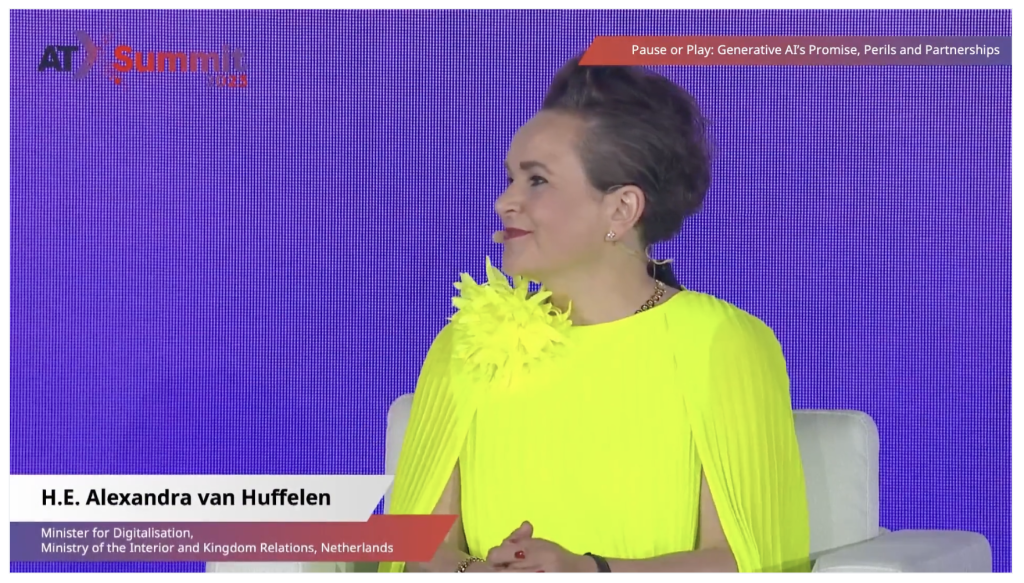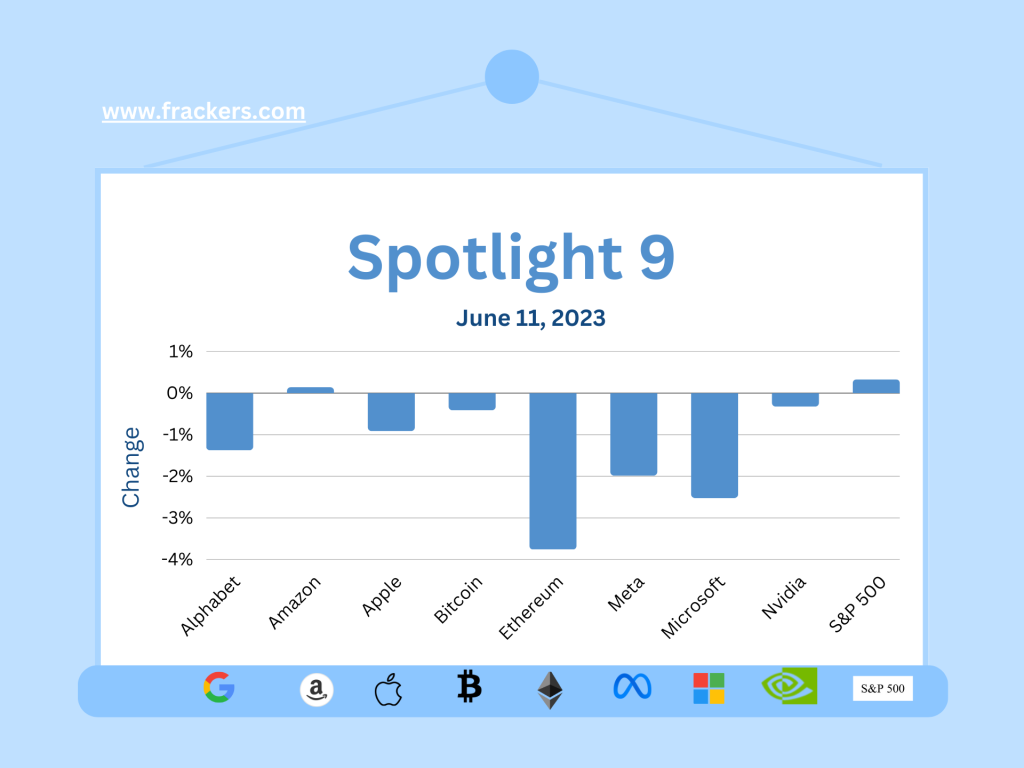
'Be curious, not judgmental.' That's the message of my favorite Ted Lasso series. Mindful of that credo, I attended the Asia Tech Summit in Singapore this week, followed the launch of the Apple Vision Pro, the magic glasses of glasses, and tried to get to the bottom of the lawsuit filed by U.S. authorities against crypto exchanges Binance and Coinbase. Unfortunately, things already went wrong during the first hour of the Asia Tech Summit, in which Secretary of State Van Huffelen was overcome by an overdose of unfounded self-confidence.

The Asia Tech Summit is particularly interesting because it brings together business and government institutions, with the idea that both sides develop an understanding of the challenges facing the other. Singapore Finance Minister and incoming Prime Minister Lawrence Wong provided the kickoff, after which Kaja Kallas (Estonia's first female prime minister) and Jacinda Ardern (New Zealand's youngest ever prime minister) paved the way for the first substantive panel, on the opportunities and threats of AI. Participating in this was State Secretary Van Huffelen, along with the president of Microsoft Asia and Nvidia's board member who deals with AI.
As the only other Dutch speaker, I was above average in my interest in Ms. Van Huffelen, and Google learned that she had a typical resume for a Dutch administrator: having been an alderman (sustainability in Rotterdam), director of a semi-governmental body (GVB in Amsterdam) and as State Secretary of Finance, she had inherited the Supplement affair, from which it is difficult to judge from a distance how adequately she had handled this painful dossier.
Nothing wrong with that, I thought, in the spirit of Ted Lasso, stay positive! After all, with the Supplements affair still in the back of her mind, hopefully she had taken a ride in Singapore on the phenomenal subway (clean, fast, cheap and safe, only resembles the GVB subway from very distant places because it is also transportation on rails) and would surely show some humility and modesty? So I expected and hoped, but nothing could be further from the truth. The state, which for incomprehensible reasons is heralded abroad as Minister of Kingdom Relations and Digitalization, went in with a straight leg almost from the kickoff.
Strategic action plan
For those with a strong stomach, the entire session can be watched back here, but the gist is that Van Huffelen sees mostly threats in AI and noted disappointment at the very beginning that nothing more has been heard of the idea of stopping AI development for six months. This is especially strange because the Dutch cabinet produced a policy paper as early as 2019 under state secretary Keijzer of EZ, which mostly sang the praises of AI. Participating in that cabinet was D66, Van Huffelen's party, and she even joined it as state secretary in 2020. There is a NL AI Coalition(NL AIC), in which government, business and knowledge institutions work together, and there is an AINed foundation that may spend 204.5 million Euros of government money to stimulate AI in the Netherlands.

Van Huffelen did not say a word about this and pretended that AI is viewed exclusively with a critical eye in the Netherlands. Her substantive contribution can be summarized as a series of clichés that the citizen comes first (gosh) and should not be forgotten (boy) and that there is more to life than making a profit; the latter she must have learned from the tens of thousands of victims of the Supplements affair.
For me, the moment at the very beginning was crucial, when it became apparent that Van Huffelen is either particularly ignorant or particularly underhanded. A combination of the two I would not rule out after her performance. After 1 minute 50, Van Huffelen literally said:
" We have seen many problems with AI, I have seen that in my country, even the AI that the government used turned out to be very biased."
state secretary Alexandra van Huffelen
Excuse me, to dismiss the Supplements affair, which has ruined the lives of tens of thousands of people, in which over 2,000 children were placed out of their homes and on which the cabinet fell in which Van Huffelen, nota bene, was himself responsible for this dossier, as a result of AI, is downright disgraceful.
Therefore, this brief refresher for Ms. Van Huffelen, who seems to have no active memory of the Supplements affair:
- until 2019, dual citizenship was a selection rule in the Tax Department. That is a policy decision made by *people*. These victims were extra checked, for years, without knowing it, and could not appeal the inclusion in this group of extra checked. This was Kafka for anyone with a foreign last name.
- The Personal Data Authority concluded that the Tax Authority's processing was "unlawful, discriminatory and therefore improper" which constituted a serious violation of the AVG. The Dutch Tax Authority itself violated Dutch law! (It is therefore downright bizarre that as recently as January 17 of this year, this article was published on the Belastingdienst's site, reporting that everything went perfectly by the book).
- Officials at the top of the Inland Revenue stopped benefits from people even though they knew they were entitled to them. Up to the highest level, it was decided to continue this unlawful approach for years .
- Inland Revenue officials demanded punishment for executives, but none were punished.
In short, the Surcharge Affair is an accumulation of wrong and evil policy instructions. It has nothing, but nothing, to do with AI. Because AI is precisely about machine learning, computer programs that get smarter as more data is added to them. Whether the Surcharge Affair was in part due to institutional racism or racial profiling I leave to sociologists and activists, but in any case it was "just" the work of incompetent and scummy people.
Ms. Van Huffelen apparently wanted to score with party colleagues tens of thousands of miles away. Perhaps the next D66 newsletter will contain a glowing passage about how their state lectured the big bad Microsoft. In any case, it will be bonus points in certain circles if Van Huffelen aspires to a job in Brussels and wants to further profile herself as a fighter for civil rights against tech capitalism. After all, she certainly wanted to profile herself.
Ready steward at the Evening Walk
Each speaker received in advance an explanation of the dress code, "business casual (for gentlemen: suit, no tie). I don't know what her letter said, but I'm sure it wasn't "ready steward at the Evening Four. Van Huffelen's yellow dress and particularly ungainly appearance by Asian standards stood out more than her substantive contribution.
If someone in Asia makes a comment on a panel with which you disagree, you don't say, especially as a representative of a country, 'that is not true.' Then you say, for example, 'I have a different viewpoint.' Or: 'another way of looking at this, is xyz'. In the audience, people wondered aloud whether Van Huffelen was wearing a beach dress and whether she had confused her islands, because 'the yellow of Cory Aquino was in the Philippines, not Singapore.' An ill-mannered Dame Edna is not what you want to portray as the Netherlands in one of the largest global markets.
The most embarrassing moment, although I wonder if Ms. Van Huffelen caught it, was when a real minister, Josephine Teo of Singapore's Ministry of Communications and Information, announced the creation of the AI Verify Foundation. Not a policy paper without clear goals, but a foundation in which business and government jointly establish tests that companies and governments worldwide can use to test AI applications. Teo emphasized that AI is so important especially for small countries like Singapore because it can increase a country's efficiency and production without additional human labor. No question.
Quantum computing near, threatens cryptography
There were more interesting announcements at the Asian Tech Summit. First, Deputy Prime Minister Heng Swee Keat reported the creation of the National Quantum-Safe Network Plus (NQSN+). That's a mouthful and requires some explanation, this site reports:
'The National Quantum-Safe Network (NQSN+) focuses on establishing a national platform and testbed for a systematic build-out of quantum-safe communication technologies, by evaluating security and demonstrating the integration of quantum-safe applications, best practices and use cases.
The main goal is to deploy commercial quantum-secure technologies for trials with government agencies and private companies; to conduct in-depth evaluations of security systems; and to develop guidelines to support companies in adopting such technologies.'
Singapore aims to secure the crucial banking sector for the long term, hence the creation of this quantum-secure network. Indeed, the importance of quantum computing will grow rapidly in the coming years. The most engaging moment during the panel I participated in, on the future of Web 3.0, was when IBM Fellow Ray Harishankar explained (starting at 25.30) why quantum computing is crossing the path of the modern Internet and will be able to retroactively crack current cryptography.
Harishankar expects that between 2030 and 2035 quantum computers suitable for specific applications will become available. His message is as simple as it is ominous: to be ready for quantum computing in 2030, organizations must have their cryptography in order now because no password will soon be safe.
Singapore is collaborating on security and standardization with South Korea, which last month announced as much as $2.6 billion dollars to invest in quantum technology research. I already can't wait to hear what Secretary of State Van Huffelen has against quantum technology.
Apple Vision Pro better device than expected, but for what?

Apple finally announced the Apple Vision Pro, the first step toward a completely new form of computing. Marques Brownlee explained in this particularly good video what the Vision Pro excels at and where the challenges lie for Apple. I was surprised that the introductory price is still $500 higher than expected: $3499 is not the price buster of the month. For that, though, the Vision Pro is packed with high-quality sensors.
As an Apple fanboy, I was pleasantly surprised by the all-new interface: nothing keyboard and mouse, but delicate eye-tracking. Look at something and the glasses see it. Blinking becomes the new buying 😉 Even though it will probably take a decade for Apple headsets to generate a significant portion (more than 10%) of sales, it's great to see that Apple is finally trying something big and hard again and not spending billions on stock buybacks.
Zuckerberg responds
Mark Zuckerberg was smart enough to take extensive time (nearly 3 hours!) right after Apple's announcement to comment with Lex Fridman. He had a strong argument that the Apple Vision Pro seems to be made for solitary use and not for communication with others. For the Apple Vision Pro and its successors, that indeed seems like the next step, as users of the iPhone but even the Apple Watch use their devices primarily to communicate, in the case of the Apple Watch as a receiver.
The complete integration of the Apple ecosystem between Mac, iPhone, Apple watch and Vision Pro will be fascinating to follow. Over the next few years, it will be interesting to see what applications Apple develops to try to make the Vision Pro a mass-market product. I remain convinced that the biggest obstacle will be getting women excited about putting on a device that messes up their hair and makeup. Then the utility or fun of an Apple Vision Pro would have to be enormous.
Zuckerberg himself, meanwhile, has the greatest possible difficulty motivating and enthusing his people. The Washington Post reported that even before the latest round of layoffs in May, which brought the total number of layoffs at Meta to as many as 21,000 jobs, confidence in his leadership among staff had fallen to 26%. Even for a Dutch politician, that would be pathetically low.
Notable links
First, two reading tips for any person interested in AI and for "Minister" Van Huffelen:
- Why AI will save the world. Netscape founder Marc Andreessen, particularly successful as an investor this century, explains in a lucid speech why AI has mostly positive aspects.
- Yuval Noah Harari argues that AI has hacked the operating system of human civilization. AI will therefore change the course of human history, says the historian and philosopher. Unfortunately only after registration; as often happens, I don't know if Harari is entirely right, but his thinking is always original and his narrative style reads delightfully.
Further:
- Interesting video in which Twitter founder Ev Williams talks about how he feels about Twitter under Elon Musk. An interview that gives the impression that the demise of his brainchild really hurts him.
- Entrepreneur and investor Auren Hoffman discovered that Midjourney has a strong gender and racial bias. The AI-generated photos of almost all smart people are male.
- It's not until 2028, SAS says, but you better get there fast: book the first electric flight.
Spotlight 9: The SEC goes wild on crypto exchanges

It was a soporific week in the stock markets, with the old school S&P 500 outperforming the tech funds. All the negativity about Bitcoin was apparently already priced in, as BTC barely dropped amid all the uproar over the announcement that the U.S. SEC has filed charges against Binance.
Last year I wrote about Binance's lack of commitment to combating money laundering. More surprising is the charge against Coinbase that the company sold shares without having the necessary licenses. In doing so, the SEC takes the position that at least some cryptocurrencies should be considered shares.
At the same time, it is not conclusively established that the SEC has the authority to pursue charges if elected representatives of the people are drafting legislation in the area the SEC is just now moving into. Former Wall Street Journal reporter Michael Casey, now the editorial boss at Coindesk, wrote a comprehensive analysis of the legal battle unfolding in the U.S. at the intersection of crypto and politics.
The shadow that the FTX debacle cast over the crypto sector has global repercussions. Also in Singapore, where unlike the Netherlands, failures do have consequences. Employees of sovereign wealth fund Temasek who invested in FTX and lost $275 million dollars (still less than one percent of invested assets) saw their salaries cut.
How much was not disclosed, but although investigations showed that all procedures had been followed, the fraud and theft by Bankman-Fried and consorts, Singapore's sovereign wealth fund managers was severely punished. I find this heavily punished, because in the end Bankman-Fried simply stole from his investors and customers, but maybe I am too Dutch and used to incompetent souls rolling from one cabinet to another.